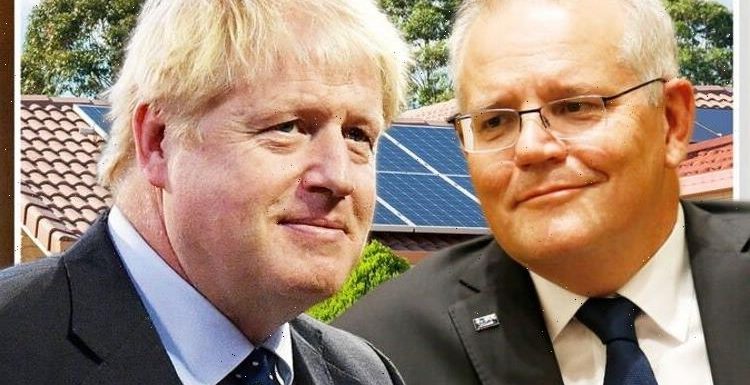
AUKUS partnership taught France ‘harsh lessons’ says Shields
We use your sign-up to provide content in ways you’ve consented to and to improve our understanding of you. This may include adverts from us and 3rd parties based on our understanding. You can unsubscribe at any time. More info
Mr Johnson and Australian Prime Minister Scott Morrison formally sealed the deal in a video conference call on Wednesday. The move signifies yet another post-Brexit deal between the two nations. With this agreement, Mr Johnson is looking to turn the UK into the biggest European partner in the Indo-Pacific.
This pact comes with two major investments in both countries.
The UK will be welcoming Australian fintech firm PEXA, as it expands into the UK as its first international market.
Meanwhile, this deal has allowed Octopus Group, a major energy firm in the UK, to begin developing a major greenfield renewables project in Australia.
The statement read: “In a boost for UK-Australia collaboration on cleantech, Octopus Australia is partnering with an Indigenous business group to create Desert Springs Octopus, a project worth £26billion over 10 years that will deliver wind, solar and hydrogen energy.”


Ahead of the announcement, Mr Johnson said: “The UK and Australia are working together to enhance regional security in the Indo-Pacific, drive innovation in science and green technology and boost opportunities for our businesses and citizens.
“Our nations are forging a new partnership from a historic alliance, fit for the next century and grounded in our shared priorities on security, democracy and free and fair trade.”
He also highlighted opportunities this “comprehensive and wide-ranging deal” will provide for British workers, businesses and consumers to “reap the benefits”.
George Freeman, the UK minister of Science said: “Delighted to announce a new UK and Australia innovation collaboration using space observation to: support climate resilience, improve crop productivity, [and] create opportunities for spacetech SMEs.”

The UK and Australia partnership will also boost cooperation on science and technology through a new Science Partnership Series to bring our world-class research communities together.
Mr Johnson also stated that the UK will enhance the UK-Australia Space Bridge Agreement, which was agreed a year ago, with “a new £1million commitment for Earth Observation in Agroclimate to help farmers deal with a changing climate.”
This agreement, to create the world’s first space bridge will unlock improved access to trade, investment and academic research opportunities, better advice to businesses and innovative bilateral collaborations, Number 10 announced.
Both countries will once again reaffirm their commitments to delivering on the Glasgow Climate Pact and Paris Agreement to keep global warming below 1.5 degrees.
DON’T MISS:
Putin strikes! Russia cuts gas supply after Biden’s troops make ‘de… [SPOTLIGHT]
Biden humiliated as Putin set for major new energy deal [REVEAL]
Call for tougher rules as new variant may be ‘more lethal’ [INSIGHT]

Britain will invest £25million for regional projects in the Indo-Pacific to counter security threats at sea, in the air and in cyberspace.
It comes after the UK was banned from the EU’s €95billion (£80billion) research funding programme – Horizon Europe.
Business and Energy Secretary Kwasi Kwarteng told the UK’s Science and Technology Committee last Wednesday that Britain was ready to go “full steam ahead” with setting up its own pioneering science programme, rather than pushing to rejoin Horizon.
The UK has announced a £6billion spending programme over three years as part of this new global science fund, to be rolled out if the EU refuses to allow association with Horizon programmes.
DON’T MISS: Macron fury as UK’s Galileo replacement storms ahead

Mr Freeman has insisted that the new “Global Britain” plan would present advantages which equalled, if not outweighed, those of Horizon.
Speaking to the Science and Technology Committee last week, Mr Freeman said: “With the right balance between continuity…recognising it is a substantial resource for some of our key research communities…we could evolve a genuinely very exciting programme where flagship fellowships are even more prestigious, perhaps longer-term than Horizon.”
He added: “We could support strategic industrial sectors like space, that aren’t allowed in [to Horizon]; we could do European and global collaboration with Five Eyes and allied countries.
“There is a very exciting opportunity to make it a very powerful global UK and international programme that drives bilateral and multilateral research.”
Source: Read Full Article